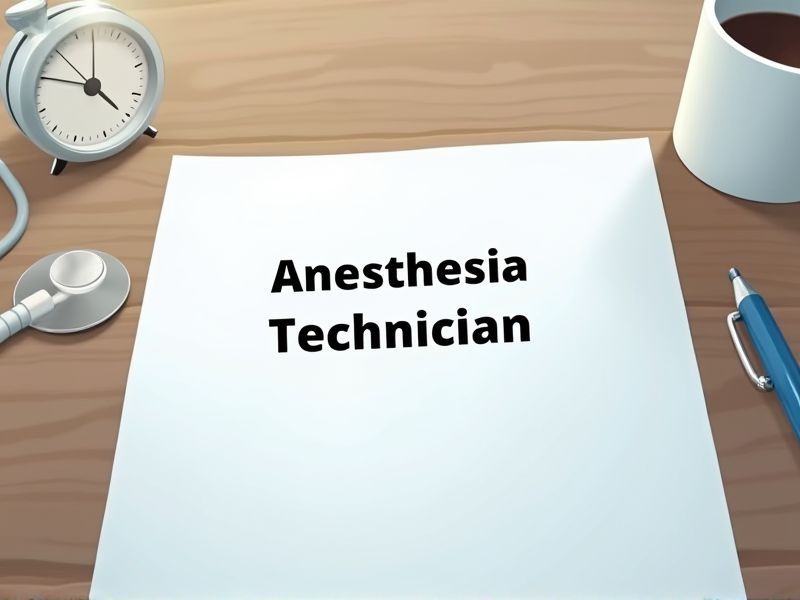
Anesthesia Technicians play a crucial role in assisting anesthesiologists, directly affecting patient outcomes during surgical procedures. Certification ensures that they possess the necessary skills and knowledge to operate equipment safely and manage potential emergencies. Without proper certifications, technicians may lack the competency to adhere to standardized protocols, potentially risking patient safety. Some important certifications that an Anesthesia Technician may need include the Certified Anesthesia Technician (Cer.A.T.) and Advanced Cardiac Life Support (ACLS) credentials.
Certified Anesthesia Technician (CAT)
The role of a Certified Anesthesia Technician (CAT) enhances patient safety by ensuring anesthesia equipment is correctly maintained and effectively prepared for procedures. Certification provides a standardized level of knowledge, reducing the risk of errors during anesthesia administration. Anesthesia teams benefit from streamlined operations and increased efficiency when a certified technician is part of the team. Certified technicians contribute to better outcomes due to their specialized training and adherence to best practices.
Basic Life Support (BLS)
Anesthesia technicians often encounter emergency situations where immediate response is critical. Basic Life Support skills enable them to provide essential care before more advanced medical help arrives. Proficiency in BLS enhances patient safety during anesthesia-related procedures. Anesthesia technicians integrate BLS to effectively support anesthesiologists in life-threatening scenarios.
Advanced Cardiac Life Support (ACLS)
Anesthesia Technicians often assist in high-stakes surgical procedures, where cardiac emergencies can arise unexpectedly, making ACLS training vital. Understanding ACLS protocols equips them to effectively support anesthesiologists in managing perioperative cardiac events. Mastery in ACLS enhances their ability to quickly recognize and react to life-threatening arrhythmias or cardiac arrests in the operating room. With ACLS proficiency, Anesthesia Technicians can contribute to improving patient survival outcomes during critical incidents.
Pediatric Advanced Life Support (PALS)
Pediatric Advanced Life Support (PALS) equips anesthesia technicians with essential skills to identify and respond to life-threatening pediatric emergencies, thereby improving patient outcomes. The structured PALS protocol aids technicians in delivering precise interventions during critical phases of a child's care, which directly impacts the efficacy of anesthesia. Certification in PALS ensures that anesthesia technicians are adept at pediatric assessment, providing them with the ability to assist in rapid and accurate decision-making in emergency situations. Training in PALS enhances teamwork and communication between anesthesia technicians and other healthcare providers, facilitating a cohesive approach to pediatric patient care.
Certified Biomedical Equipment Technician (CBET)
A Certified Biomedical Equipment Technician (CBET) ensures that anesthesia equipment is properly maintained and calibrated, which directly impacts patient safety and outcomes. The detailed knowledge CBETs have regarding complex equipment reduces the risk of malfunction during critical procedures. Anesthesia technicians benefit from CBET expertise because it enhances the reliability of the equipment, minimizing downtime and ensuring continuous operation. Hospitals and surgical centers demand CBET involvement to meet regulatory compliance and quality assurance standards, fostering a safer clinical environment.
Certified Operating Room Technician (CORT)
Certified Operating Room Technicians ensure that surgical environments are sterile, which directly reduces the risk of infections during procedures. Anesthesia Technicians rely on the CORT to maintain organized and functional operating rooms, enabling them to efficiently manage anesthesia equipment. Proper assistance from a CORT during surgery allows Anesthesia Technicians to focus on patient monitoring and proper drug administration. CORTs quickly respond to unforeseen surgical complications, ensuring Anesthesia Technicians can adapt to changing situations without logistical concerns.
Sterile Processing Certification (CSP)
Certification in Sterile Processing is crucial for Anesthesia Technicians because it ensures they adhere to strict infection control standards, preventing postoperative infections. Trained technicians enhance patient safety by correctly sterilizing and managing surgical instruments. Certification also implies a standardized competence, improving efficiency and reducing errors in the surgical suite. Employers may prefer certified technicians due to reduced liability and improved patient care outcomes.
Certified Infection Control Practitioner (CIC)
Anesthesia Technicians frequently work in environments where infection risks are heightened, such as operating rooms. A Certified Infection Control Practitioner (CIC) provides specialized knowledge to implement effective infection prevention protocols in these settings. Their expertise helps in reducing hospital-acquired infections, which can lead to improved patient safety and outcomes. Collaboration with a CIC ensures that anesthesia practices stay compliant with the latest health regulations and standards.
Emergency Medical Technician (EMT) Certification
EMT certification equips anesthesia technicians with critical skills in patient assessment and emergency response, essential during complications in anesthesia. Proficiency in basic life support and immediate care allows them to assist effectively in critical situations, enhancing patient safety. Understanding pre-hospital care protocols prepares anesthesia technicians to collaborate seamlessly with emergency medical personnel. The certification endorses their ability to respond adeptly in high-pressure medical scenarios, promoting overall healthcare efficiency.
Anesthesia Equipment Specialist Certification
Certification for Anesthesia Equipment Specialists ensures that anesthesia technicians possess the necessary knowledge to effectively manage and operate advanced anesthesia machines. It establishes a standardized level of competency, reducing the risk of errors during surgical procedures. Hospitals and clinics benefit from certified technicians by maintaining compliance with safety regulations, thus minimizing legal liabilities. The certification instills confidence in healthcare teams, enhancing the overall quality of patient care during anesthesia administration.
Summary
You, as an Anesthesia Technician, can anticipate enhanced job prospects and higher earning potential with additional certifications. Certifications demonstrate advanced knowledge and skills, which makes you more appealing to potential employers. In the workplace, colleagues and supervisors might regard you with increased respect and trust in handling complex tasks. With these certifications, there is often a greater opportunity for career advancement and specialized roles.
